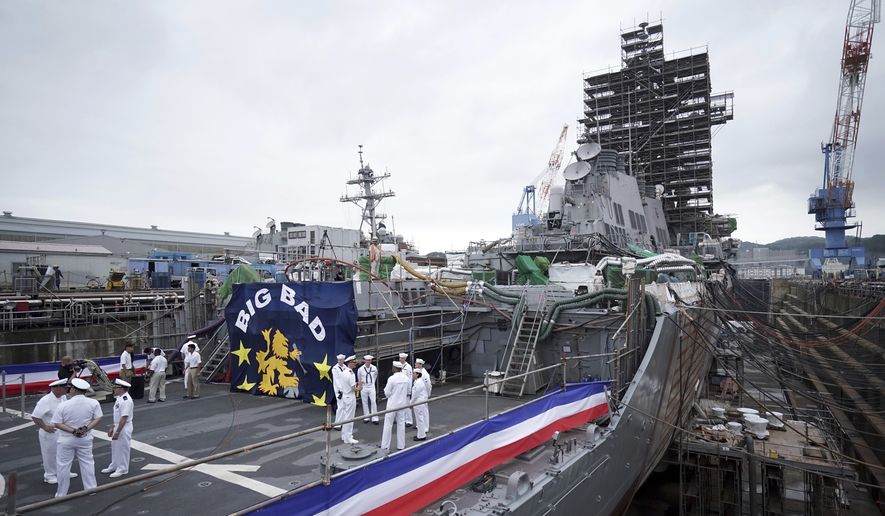OPINION:
A threat to the global oil supply imperils the global economy. Iran’s menacing behavior toward oil shipments moving past its shores is just such a threat. The community of nations cringes at the notion of the United States acting as the world’s policeman. The American people do, too. But when conflict erupts on the high seas, as on land, who but the Americans are expected to do something about it.
Civility may someday outlast malevolence, but not today. Iran is proof of that. Even while Japanese Prime Minister Shinzo Abe attempted to mediate peace with the Islamic republic in Tehran last week, a Japanese oil tanker moving through the Gulf of Oman was hit by something bad, probably a magnetic mine sowed by Iranian amphibious forces. A Norwegian tanker received the same unfriendly treatment. So much for the Persian tradition of treating guests better than family.
A more modern Iranian tradition is to oppose the United States in every deed and nearly every word. The one exception was the 2015 Iranian Nuclear Deal, in which the regime agreed to President Obama’s request to slow down its quest for nuclear weapons in return for hundreds of billions of dollars and inviting commercial opportunities. President Trump’s decision to halt the nonsense, reimpose economic sanctions and hold the mullahs’ feet to the fire has, predictably, rekindled Islamic wrath.
Retaliation by targeting oil shipments in the Persian Gulf have occurred twice recently, damaging six tankers, with a denial of Tehran’s involvement (which fails the giggle test). Taken together with the announcement that Iran intends to pay no attention to the limit on its enriched-uranium stockpile, as agreed to in Mr. Obama’s celebrated nuclear deal. There can be no doubt the Tehran regime is trying to increase pressure on Mr. Trump to drop the economy-strangling sanctions. The mullahs may learn that Mr. Trump is cut from hickory, not Obama soft pine. Russia stands all but alone calling Iranian mischief as a “baseless accusation.”
When vows of belligerence lead to similar huffing and puffing, it’s tempting to call them all morally equivalent. But Tehran has echoed for 40 years with shrill cries of “death to America,” and America, which could deal with the mullahs before the cocktail hour, has simply tried to keep a lid on mullah-manufactured Middle East mischief as a service to the nations that can’t help, or won’t.
This is not the first time the U.S. Navy has taken the lead in protecting the shipping fleets of the world. U.S. warships rode shotgun for tankers and container ships harassed by Iranian naval ships during the wind-down of the Iran-Iraq war in 1987. The attacks stopped after U.S. destroyers shelled Iranian oil platforms used to stage the attacks.
With the recent mining of troubled waters, Sen. Tom Cotton, Arkansas Republican, advocates a U.S. military response. “These unprovoked attacks on commercial shipping warrant a retaliatory military strike,” he told CBS News. For his part, however, Mr. Trump has rightly frowned on the idea of going to war with Iran.
Before committing to war, or even to pin-prick retaliation, it’s important to gauge the impact of Iran’s bad behavior. So far, it’s not much. Oil spiked briefly 4.5 percent to $62 a barrel following attacks, then settled lower than in the previous week.
As a measured response, the president could summon a coalition of oil-importing nations to provide naval escorts for Persian Gulf shipping. That should satisfy the European Union, perhaps fatally addicted to appeasement, whose leaders counsel watchful waiting. Perhaps the tankers merely bumped into a whale. China and India have a serious interest in the free flow of oil through the Persian Gulf, the source of half of their oil imports. Japan, South Korea and the Philippines count on the Gulf for three-quarters of their imports.
By contrast, nearly 90 percent of the oil Americans use is pumped from native ground. More than half of U.S. petroleum imports originate in Canada and Mexico, and only about 16 percent of its imports come from Persian Gulf nations.
Though a minor customer for Middle East oil, America has played an outsized role in keeping that energy flowing into the world economy. Other nations with a stake in the game should step up to do their part in escorting vulnerable ships past peril, preserving freedom and safety of navigation. We won’t hold our breath.




Please read our comment policy before commenting.